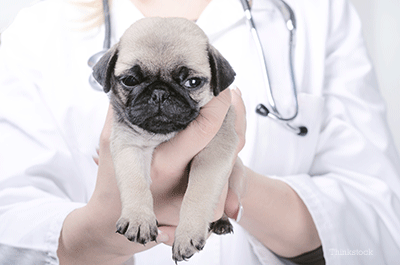What can a dog poop sample tell your veterinarian about your dog’s health? As it turns out, a lot!
 1. Parasites in dog poop
1. Parasites in dog poop
By analyzing a dog poop sample under a microscope your veterinarian can detect internal parasites, even if they are not producing signs of disease. Some parasites (worms) like tapeworms are often passed in the stools. Less often, spaghetti like roundworms may be seen in the dog poop. Because many drugs used to prevent heartworms are also used to prevent intestinal parasites, finding signs of worms in dog poop tells your veterinarian that perhaps your dog is, for some reason, not getting his heartworm preventive every month.
2. Abnormal odors in dog poop
Granted, poop never smells good, but unusual odors, beyond what you would expect, or the presence of blood or mucus are indications of inflammation in the intestines. Abnormal stools don’t always give your veterinarian a specific cause for the abnormality but will let him know to looking further.
3. Signs of bleeding in dog poop
The color of dog poop is important. If stools are red, it indicates fresh blood--probably from the lower intestines. (Note: Dogs do not develop hemorrhoids like humans that could produce fresh blood.) Very dark or black stools indicate bleeding higher in the stomach or upper intestines where digestive acids break down blood.
4. Foreign objects in dog poop
Some dogs develop a habit of swallowing undesirable materials (pica). White stools indicate that your dog is eating excessive bones in his diet or perhaps swallowing rocks containing chalk. Both are a potential problem. Foreign materials like gravel, twigs or even pieces of plastic crayons indicate your pet is chewing on potentially harmful things.
5. The consistency and moisture content of dog poop
This can tell your veterinarian a lot. Very hard and crumbly poop indicates constipation and possibly dehydration. Watery stools indicate intestinal inflammation.
Abnormal stools for more than a few days can indicate serious problems. It’s a good idea to know what your dog's poop normally looks like so you can be alerted to abnormalities and notify your veterinarian as soon as possible.
If you have any questions or concerns, you should always visit or call your veterinarian -- they are your best resource to ensure the health and well-being of your pets.
